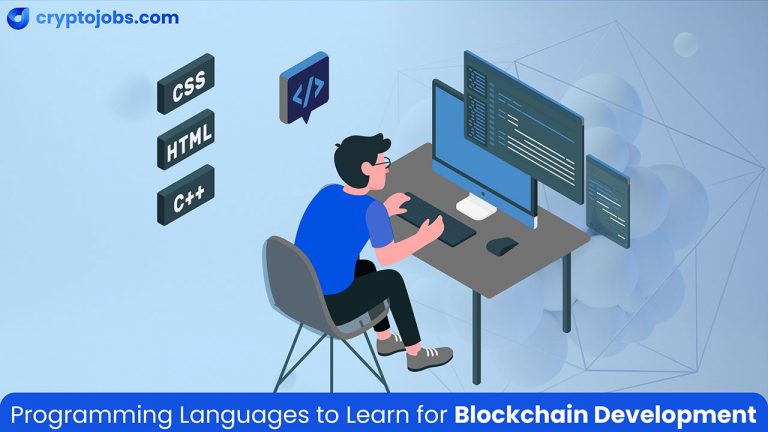
Top 5 Programming Languages for Blockchain Development!
- cryptojobs.com
- July 24, 2023
- All Posts, Career Guide
- blockchain developer
- 0 Comments
Developing blockchain apps requires comprehensive knowledge of coding. The rapid evolution of blockchain demands developers with the skills to create and maintain it. Many developers are eager to jump into the field of blockchain development. To succeed in the world of crypto, it’s important to know what coding languages and skills are required.
Blockchain technology has taken the world by storm. Every day, new innovations and developments emerge in this industry. Blockchain offers new ways of handling transactions and storing data. Blockchain is based on complex mathematical algorithms. Therefore, they require an in-depth understanding of programming languages and concepts.
People who are interested in blockchain might be curious to know about programming languages. The guide is the ultimate solution for anyone looking for information on crypto languages and software.
Let’s explore the top 5 programming languages for blockchain development!
Python
Python is a high-level programming language that is widely used in crypto. It’s simple and easy to use. For newbies, Python is the best language for Blockchain Programming. It’s more user-friendly and has comparatively shortcodes.
Python is ideal for building crypto applications like wallets and trading bots. It has different libraries and frameworks including Pandas, NumPy, and Flask. They simplify data manipulation, scientific computing, and web development.
Python also has a rich ecosystem of third-party packages including PyCryptodome and Pybitcointools. These packages provide cryptographic functionality and Bitcoin scripting.
C++
C++ is a high-level programming language. It’s used to develop different blockchain platforms. These platforms include Bitcoin and EOS. C++ was first introduced in 1985 by Bjarne Stroustrup.
C++ is a popular language among Blockchain Programming developers. This language is pretty decent in terms of multi-threading, run-time polymorphism, and function overloading.
C++ allows developers to customize the data according to their requirements. This programming language is widely used for the development of Blockchain applications such as Bitcoin, Ripple, Stellar, and others.
Java
Java is a widely used programming language for developing websites and web applications. It’s also used on several popular blockchain platforms such as Ethereum, Hyperledger Fabric, IOTA, NEO, and more.
James Gosling discovered Java in 1995. It supports a powerful Application Programming Interface (API) for class-based object-oriented programming. The most commonly used features of Java in blockchain programming include API, Object-Oriented Programming (OOP), and Portability.
JavaScript can be used for both front-end and back-end development. It has many libraries and frameworks like React and Node.js. These frameworks simplify web development and provide robust functionality for building decentralized apps.
Solidity
Solidity is a contract-oriented programming language. It’s used to write smart contracts on the Ethereum blockchain platform. It’s a high-level language that’s similar to JavaScript. It’s designed to be secure and auditable.
Solidity’s syntax is easy to learn, making it an excellent choice for beginners in the blockchain development field. In the world of Blockchain programming, Solidity is the most widely used and stable language. Both freshers and experienced professionals can easily learn this language.
Go
Go, also known as Golang, is a modern programming language designed to be efficient and scalable. It’s used in blockchain development for building dApps and smart contracts on platforms like Hyperledger Fabric and Ethereum. Go’s ability to handle large data sets and concurrency makes it an excellent choice for blockchain developers.
Blockchain Programming developers prefer Golang due to its notable features. Golang is ideal for developers as it’s user-friendly, fast, and flexible. This programming language is highly beneficial for both freshers and tech enthusiasts.
C#
C# is an ideal programming language for blockchain. C# is pronounced as C sharp. It’s a powerful and modern programming language. It’s an object-oriented language that’s designed to be simple, safe, and efficient. C# is a popular choice for building desktop applications, web applications, games, and more.
C# syntax is similar to that of Java and C++. It makes it easy for developers to switch between these two languages. Its syntax is also clean and concise. It allows developers to write code quickly and efficiently.
Rholang
Rholang is one of the top programming languages for blockchain development. It’s used for the development of smart contracts. This language uses a functional approach to resolve different blockchain issues.
Rholang applications examine the entire program as a series of functions and solve them in order. Unlike C or Python, this is a very different language. In Rholang, variables are used to store data, and their values are changed over time. Unlike most other blockchain development languages, Rholang uses a functional programming model.
PHP
PHP is another popular programming language. It has been widely adopted for building blockchain apps. PHP is used to develop blockchain solutions of different complexity levels. It provides a simple and effective way to interact with blockchain. It enables developers to create web applications to connect and interact with decentralized networks.
Developers can easily build smart contracts, create blockchain-based payment systems, and develop decentralized apps with PHP.
PHP has a large and active community of developers. It provides extensive support and resources for blockchain development. It offers various features that make it a powerful tool for building decentralized applications.
Final Words!
After learning about the top 8 blockchain programming languages, you might wonder which one is best for your project. Each of these languages has its unique strengths and capabilities, and the choice of language ultimately depends on the specific requirements of the project. Using these languages, developers can develop robust and secure blockchain apps that will shape the future of decentralized computing.




